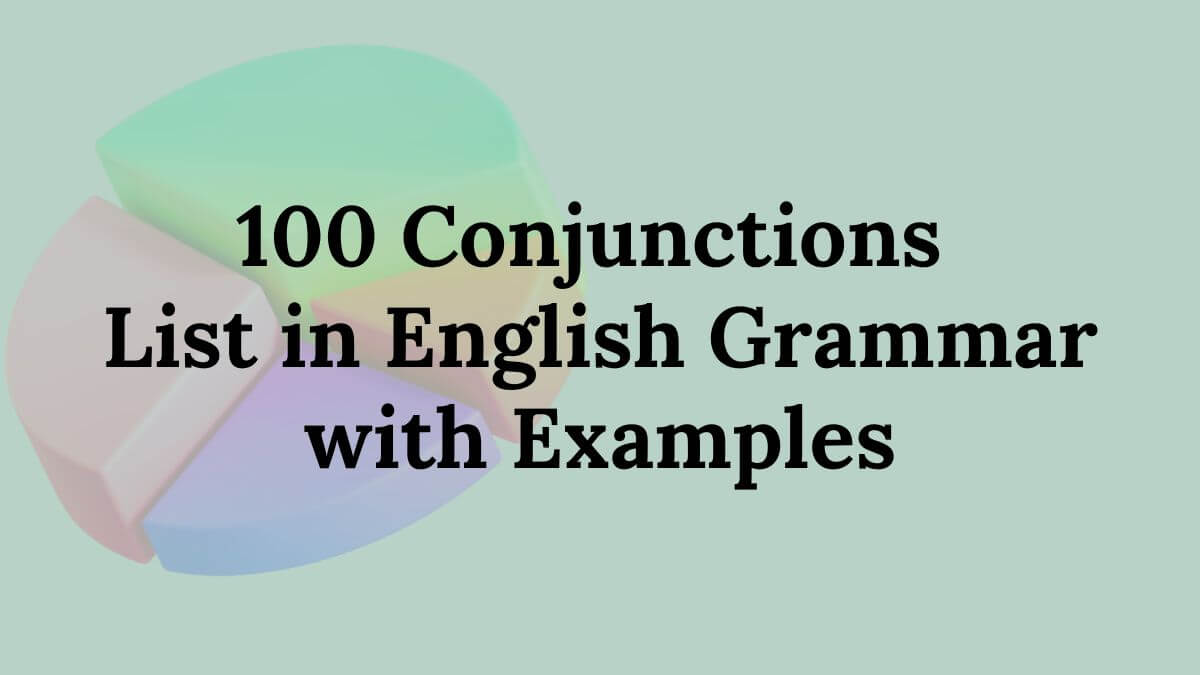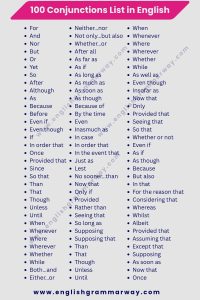Conjunctions are essential words in English grammar that connect sentences, phrases, and ideas. In this guide, you will learn 100 different conjunctions, their types, and practical examples for fluent writing.
Understanding conjunctions helps improve clarity and flow in your sentences. This conjunctions list includes easy-to-use examples, tips, and explanations that will strengthen both writing and speaking skills naturally.
What are Conjunctions?
A conjunction is a word used to join words, phrases, or clauses together. It acts as a bridge between ideas, helping sentences sound complete and coherent.
Example:
- I like coffee and tea.
- She stayed home because it was raining.
Conjunctions make communication smooth and logical, preventing sentences from sounding choppy.
100 Conjunctions List in English
Here is a comprehensive list categorised by type. Each word includes an example to make learning easier.
- For – I stayed in, for it was raining.
- And – She likes tea and coffee.
- Nor – He doesn’t like tea, nor coffee.
- But – I wanted to go, but it rained.
- Or – Do you want tea or coffee?
- Yet – She is tired, yet she continues working.
- So – It was raining, so I stayed home.
- After – I went out after lunch.
- Although – Although it rained, we went out.
- As – He ran as fast as he could.
- Because – I stayed home because it was raining.
- Before – Wash your hands before eating.
- Even if – I will go, even if it rains.
- Even though – Even though she was tired, she worked.
- If – We can go if it stops raining.
- In order that – I study hard in order that I pass.
- Once – Once you finish, call me.
- Provided that – I will help, provided that you ask nicely.
- Since – Since it’s raining, we will stay inside.
- So that – I spoke slowly so that everyone could understand.
- Than – She is taller than her brother.
- That – I know that he is right.
- Though – Though tired, he kept working.
- Unless – Don’t go out unless necessary.
- Until – Wait here until I return.
- When – Call me when you arrive.
- Whenever – Whenever I see her, she smiles.
- Where – Go where you feel comfortable.
- Wherever – Sit wherever you like.
- Whether – I don’t know whether she will come.
- While – He read a book while waiting.
- Both…and – Both John and Mary are coming.
- Either…or – You can either stay or leave.
- Neither…nor – She likes neither tea nor coffee.
- Not only…but also – He is not only smart but also kind.
- Whether…or – Decide whether to go or stay.
- After all – He helped me, after all.
- As if – He acted as if he knew everything.
- As long as – You can go as long as you finish homework.
- As soon as – Call me as soon as you arrive.
- As though – She looks as though she’s tired.
- Because of – We stayed home because of rain.
- By the time – By the time I arrived, it ended.
- In case – Take an umbrella in case it rains.
- Inasmuch as – Inasmuch as you helped, I’m grateful.
- Just as – He arrived just as we were leaving.
- Now that – Now that it’s summer, we swim more.
- Only if – You can go only if you finish your work.
- Provided – You can go out, provided you finish your homework.
- Rather than – I prefer tea rather than coffee.
- Seeing that – Seeing that it rained, we stayed home.
- So long as – You can borrow it so long as you return it.
- Supposing – Supposing it rains, what will we do?
- Than – She is taller than her sister.
- That – I know that he is right.
- Though – Though tired, he studied more.
- Unless – Don’t go out unless necessary.
- Until – Wait until I arrive.
- When – Call me when you finish.
- Whenever – Whenever I see him, he smiles.
- Where – Sit where comfortable.
- Wherever – Go wherever you want.
- Whether – Decide whether to stay or leave.
- While – He slept while we were talking.
- As well as – She sings as well as dances.
- Lest – He stayed quiet lest he offend anyone.
- As far as – As far as I know, he is honest.
- As much as – I love her as much as my life.
- As soon as – Call me as soon as possible.
- Insofar as – Insofar as I understand, he is right.
- In that – Useful, in that it saves time.
- In the event that – Take an umbrella in the event that it rains.
- No sooner…than – No sooner had I arrived than it rained.
- Now that – Now that you are here, we can start.
- Only – You can go only if ready.
- Provided that – Help him, provided that he asks.
- Seeing that – Seeing that it’s raining, we stayed home.
- So that – Speak slowly so that everyone understands.
- Supposing that – Supposing that it rains, what do we do?
- Than – She runs faster than him.
- That – I hope that you succeed.
- Though – Though tired, she continued.
- Unless – Don’t go unless necessary.
- Until – Stay here until I return.
- When – Call when ready.
- Whenever – Smile whenever possible.
- Where – Sit where convenient.
- Wherever – Go wherever you like.
- Whether – Think about whether to go or stay.
- While – Study while listening.
- As long as – You can borrow it as long as returned.
- Even though – Even though tired, he helped.
- In order that – I study in order that I pass.
- Provided – Stay safe, provided you follow instructions.
- Rather than – Use tea rather than coffee.
- Even if – I will go, even if it rains.
- As if – He acted as if he knew.
- As though – She looks as though tired.
- Because – I stayed home because it rained.
- And – She sings and dances.
How to Use Conjunctions Correctly
- Avoid run-on sentences: Use conjunctions to join ideas smoothly.
- Use commas correctly: With coordinating conjunctions joining independent clauses.
- Match subordinating conjunctions: Correctly attach dependent clauses.
- Use correlative pairs properly: Keep balance in sentences.
Example:
- Incorrect: I like tea but not coffee.
- Correct: I like tea, but I also like coffee.
Tips for Mastering Conjunctions
- Read regularly: Notice how authors use conjunctions.
- Write daily: Practice using different conjunctions in sentences.
- Review lists: Keep a reference handy for learning.
- Speak naturally: Include conjunctions in conversations for fluency.
These habits strengthen both written and spoken English.
Common Mistakes to Avoid
- Overusing “and” or “but” makes writing dull.
- Incorrect correlative pairings confuse readers.
- Omitting commas in compound sentences can mislead the meaning.
- Misplacing subordinating conjunctions makes sentences unclear.
Conclusion
Learning this conjunctions list in English grammar will improve your sentence structure and clarity. Practising these words and referring to conjunction examples regularly ensures your writing flows naturally and effectively.
Conjunctions are the glue of language – master them, and your English communication will become smoother, clearer, and more professional.

